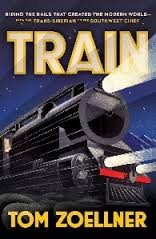Zoellner is, of course, not as strident as is the reliably strident Bibliofella, at least as regards abolition of handguns. The book is actually a reasonable, sincere, fair history and meditation with mainstream politics. Maybe just go out and buy a copy, read it, and then mail it to a pro-gun legislator of your choosing. Or carry it with you, a kind of fetish or totem, especially if you are not the button-wearing, signature-gathering type. See cute, crying, reading-in-public woman on the train, below, if you are looking for a segue from the public policy debate to trains. It seems books have all kinds of purposes.
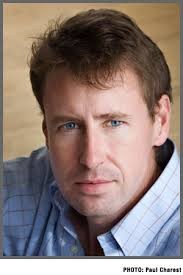
Meanwhile, Zoellner has produced writing as smart and engaging as always expected from the Arizona-born author of previous nonfiction books on the social and political stories of uranium, and diamonds, respectively, the real-life biography of the humanitarian fella behind the Hotel Rwanda story, as well as a kind of how-to book on collecting, using oral histories so you can write your own life story, or somebody else's. Eclectic dude, a professional writer, a fellow with wild curiosity and a yet a confidence and calmness about it all, but with — as in the new book — a real generous sense of wonder, and sharing it.
Here's the opening of Train, an unshy appeal, a confession, an invitation, a scene, and the segue I promised above, illustrating the wonderful, weird connection between locomotion and literacy, reading and feeling and riding the life of the mind while chugging, flying, training along:
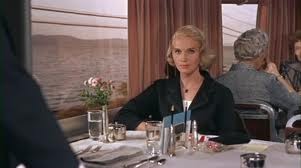
Twenty years after I saw her, I still remember the young woman across the aisle from me on a train traveling through a snowstorm in Pennsylvania. She was half visible in the overhead lamp, a novel on her lap. Whatever she was reading was making her cry softly. I couldn't see the title, and I was too shy to ask, but the sight of her — emotionally transported into one world as she was physically transported in another — made me feel my individuality dissolving.
There's more, in fact three hundred pages, of observing and learning and falling a little in love but there it is. Zing. The romance, the promise, the meta-nonfiction pointing to a story of rail romance, of the romance of the rails, of the romance of storytelling itself, with the clackity-clack and the movement, the kinetic consciousness, perhaps because you are sitting still inside this vehicle that transports, in every way. And, yes, it's onward, with passenger Tom on a total of seven of the most historic, idiosyncratic, vital train rides of the world, the ones you wish you could take, with or without Eva Marie Saint, who made trains and sex and adventure so appealing in North by Northwest.
In fact, if you don't know his work (and even if you do) it's fun to spend some time first on Chief Engineer

Tom Zoellner's nifty w
eb site, where he is described, both modestly and perfectly as “Author, Journalist, Professor.” Scroll down and find photos galore of Zoellner traveling by trains all over the world, There's a slide show, of him in Britain, India, China, Peru, Spain, Russia. All of these are humanly constructed locales, the rail lines themselves trespassing all over topographic and national and geographic boundaries much more real: the Andes, the Himalayas, Siberia (a disaster), like that. So that the adventures are really about the tracks, the going-through on a proscribed route, and that odd syntactical and existential perspective where stationary objects “pass by,” when what is really happening is our own passage.
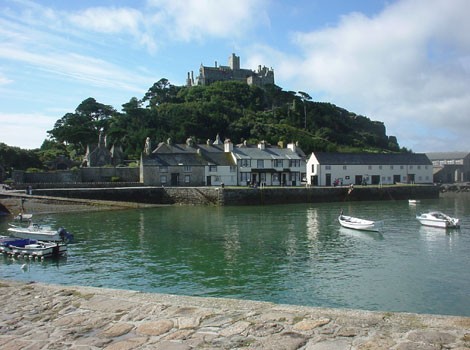
The first classic train trip is Pentland Firth to Land's End, which is English English nomenclature for Scotland south to just a mile or two beyond this nifty vista point, through Penzance, the last bit of which Zoellner had to hitchhike and walk after covering the nearly 600 miles overland by rail, north to south, top to bottom of the island, with of course a history of the railroad generally along the way, and the fascinating, sometimes wonderfully digressive story of the British cultural-mechanical-societal-political role in the whole experience of riding the choo-choo. He meets some wonderful, eccentric, lovely people along the way. More romance, and food and countryside, with stop-overs in big cities with magnificent or ugly or ancient or modern train stations.
Then he's off to India, world's largest democracy and largest train infrastructure, where among other sights we see a giant bureaucracy over-employing people (cuz India has a lot of 'em), affirming the role of big government I guess, and balancing a kind of populist claim on the imagination with the practical need to give people, very poor people, something that moves, that occupies, that affirms.
All along, world-wide, there is, however the individual experience, especially a reader's experience. Chicago to Los Angeles is a story, and not just a story of trains, but of America. And, thankfully, Zoellner himself reads and studies and teaches along the way. I suppose somebody could have plugged in, watched a movie on a machine, drowned out all the lore and legend, the associations and digressions. Not Zoellner, good for us. He is himself a regular train commuter, from LA to OC on Amtrak, and seems to have located the theater of it all, the platform if you will, for making more. Does riding the train make you smarter, more literate, more aware? Perhaps.
I love this short passage, back in England, where the “author, journalist, professor” shares the necessary explanation for that reading-railing connection:
The earliest train carriages were built like stagecoaches with benches facing one another, which might mean the horror of prolonged eye contact. The silences could be excruciating. And so the habit of reading a book while traveling — as an escape from boredom and awkwardness — led to a literacy explosion among the bourgeois classes as low-cost books became widely available with the railway stations.
Talk about making your connection. Literacy, commuting, class analysis, social mores. All aboard!
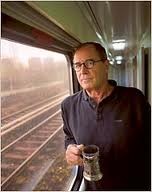
I began this morning with kudos for Chapman. Lucky students, lucky readers, to have Zoellner and his new book. I'll end by pulling a line from the Kirkus Review review of the book, which must have made T.Z. happy, happier, happiest: “Great for fans of Paul Theroux's railroad journeys, except that Zoellner isn't anywhere near as ill-tempered, and he has a better command of social history. A pleasure for literate travelers.” Sweet.
Train: Riding the Rails that Created the Modern World – From the Trans-Siberian to the Southwest Chief, Tom Zoellner, Viking, 330 pgs., $27.95
A Safeway in Arizona: What the Gabrielle Giffords Shooting Tells Us About the Grand Canyon State and Life in America, Tom Zoellner, Viking, 288 pgs. $26.95
Andrew Tonkovich hosts the Wednesday night literary arts program Bibliocracy Radio on KPFK 90.7 FM in Southern California.
